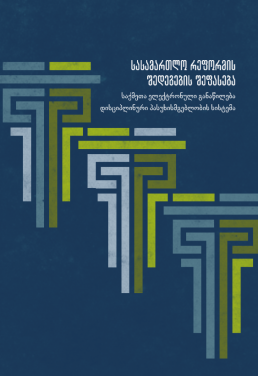Present report describes and assesses the two novelties introduced in the so-called “third wave” of the judiciary reform: the electronic system of case distribution and the system for disciplinary liability of judges as the office of Independent Inspector has been put into action.
Introduction of the electronic system for case distribution in Common Courts is one of the most important reforms of recent years. It is designed to tackle a range of challenges in terms of the independence and impartiality of Courts. The new system is based on the principle of random distribution of cases between the judges.
As for the system for disciplinary liability of judges, within the “third wave” reform the office of Independent Inspector has been set up in the High Council of Justice that limited excessive exclusive powers of the Secretary of the High Council of Justice at the initial stage of disciplinary proceedings; deadlines for preliminary examination and investigation of disciplinary cases have been established; The legal guarantees of judges have been increased in the course of disciplinary proceedings.
Monitoring of the new system for case distribution and the proceedings for disciplinary liability of judges and analysis of national legislation, international recommendations and standards, the decisions of the High Council of Justice exposed that despite legislative amendments the following issues still remain unsolved:
New electronic system for case distribution
- There are a number of issues that remain open at the legislative level, settling of which was entrusted by the Parliament to the High Council of Justice;
- The insufficient number of judges excludes the possibility of the random distribution in all common courts;
- Due to the fragmented and intermittent changes adopted by the High Council of Justice the list of exemptions from random distribution has been dramatically increased;
- From December 31, 2017 to December 31, 2018, only 62% of cases distributed through the electronic system were allocated with using the random distribution principle;
- The Chairmen of the Courts have maintained several vague and problematic authorities. Authority of Chairperson to assign judges to narrow specialties raises special concerns;
- During the system failure, the process of distributing cases by the Chancellery staff between the judges based on the sequential rule is flawed. The important rules applicable during delays in the system are regulated by the normative act of the High Council of Justice;
- Several provisions of the procedural legislation are in contrary to the fundamental principles of random distribution;
The system for disciplinary liability of judges and the performance of the Independent Inspector
- The objectives of disciplinary liability of judges are not still determined in the Organic Law that creates a threat of the misuse of disciplinary regulations. Also, the types of disciplinary misconduct of a judge as specified by the Organic Law are still general, that makes the possibility of broad interpretation and do not meet the criteria of foreseeability and clarity and leads to risks of the diminishing independence of individual judges;
- Organic law does not adequately ensure institutional independence guarantees for the Inspector;
- The difference between the number of reports submitted to the Independent Inspector on the alleged misconduct of the judges and the number of initiated prosecutions and disciplinary proceedings against judges is still noticeable. In addition, the number of suspended disciplinary proceedings is increasing. Out of 699 facts of alleged disciplinary misconduct, disciplinary proceedings were terminated in 186 cases, disciplinary prosecutions were initiated in 33 cases and only in 4 cases a judge was charged with disciplinary liability;
- Despite determining the timeframe for the preliminary inspection and examination of the disciplinary case, disciplinary proceedings are being conducted in missing the deadlines;
- The decisions on termination of disciplinary proceedings are not uniform, some decisions lack substantiation, and number decisions are completely unsubstantiated; The final conclusions of the Independent Inspector are not available to the public, that remains as an important challenge in terms of transparency in the whole process;
- To date, none of the judges have exercised their right to the public disciplinary hearing.
This report has been produced with the assistance of the European Union. Its contents are the sole responsibility of Human Rights Education and Monitoring Center (EMC) and Institute for Development of Freedom of Information (IDFI) and do not necessarily reflect the views of the European Union.

